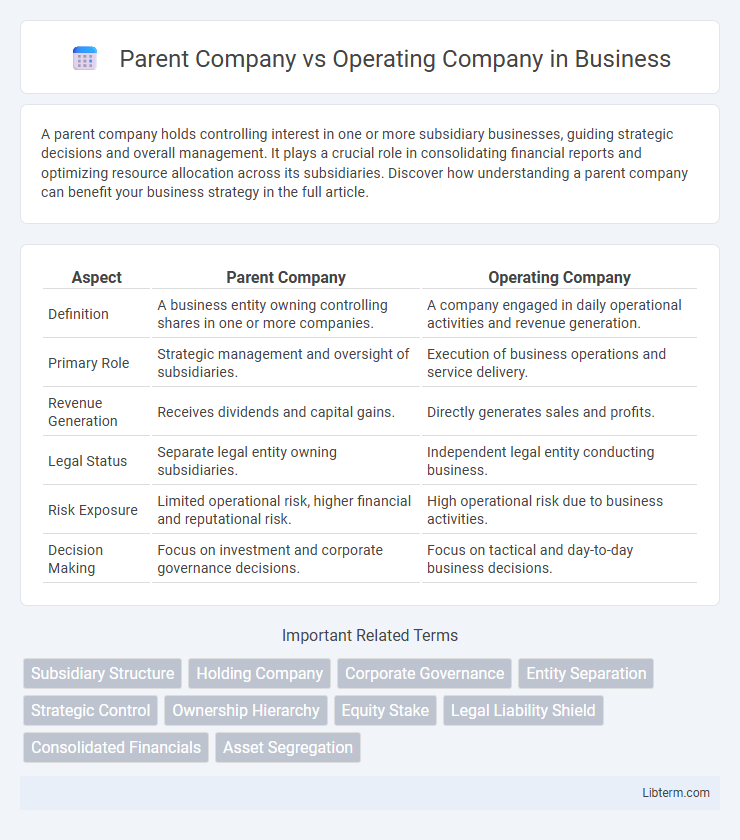A parent company holds controlling interest in one or more subsidiary businesses, guiding strategic decisions and overall management. It plays a crucial role in consolidating financial reports and optimizing resource allocation across its subsidiaries. Discover how understanding a parent company can benefit your business strategy in the full article.
Table of Comparison
| Aspect | Parent Company | Operating Company |
|---|---|---|
| Definition | A business entity owning controlling shares in one or more companies. | A company engaged in daily operational activities and revenue generation. |
| Primary Role | Strategic management and oversight of subsidiaries. | Execution of business operations and service delivery. |
| Revenue Generation | Receives dividends and capital gains. | Directly generates sales and profits. |
| Legal Status | Separate legal entity owning subsidiaries. | Independent legal entity conducting business. |
| Risk Exposure | Limited operational risk, higher financial and reputational risk. | High operational risk due to business activities. |
| Decision Making | Focus on investment and corporate governance decisions. | Focus on tactical and day-to-day business decisions. |
Introduction to Parent and Operating Companies
A parent company is a business entity that owns enough voting stock in another company to control its management and policies, establishing the subsidiary as a separate legal entity. An operating company actively engages in business activities, such as producing goods or providing services, and may be wholly or partially owned by a parent company. Understanding the distinction helps clarify corporate structures, decision-making authority, and financial reporting responsibilities.
Defining a Parent Company
A parent company is a business entity that holds a controlling interest in one or more subsidiary companies, typically by owning more than 50% of their voting stock. It exerts significant influence over the subsidiary's operations, strategic decisions, and financial policies without necessarily engaging in day-to-day activities. This structure allows the parent company to manage risks, streamline management, and consolidate financial results across its subsidiaries.
Understanding an Operating Company
An operating company is a business entity actively engaged in producing goods or delivering services, generating revenue through daily operations. It functions independently by managing its resources, workforce, and operational activities to fulfill its business objectives. Unlike a parent company, which primarily holds controlling interests and oversees subsidiaries, the operating company executes the core commercial activities essential for market presence and growth.
Key Differences Between Parent and Operating Companies
A parent company holds controlling interest and ownership over one or more subsidiary companies, providing strategic direction and financial management. An operating company is a business entity that engages in day-to-day commercial activities, generating revenue through its products or services. Key differences include ownership structure, with the parent company controlling assets and liabilities, while the operating company manages operational risks and business execution.
Legal Structure and Ownership
A parent company holds ownership of one or more operating companies, maintaining control through majority stock holdings or equity stakes. The legal structure of a parent company is typically that of a holding company, which exists primarily to own shares and does not engage in daily business operations. Operating companies function as separate legal entities responsible for managing daily activities, liabilities, and operations while remaining accountable to the parent company's strategic direction.
Financial Relationships and Responsibilities
A parent company holds a controlling interest in one or more operating companies and consolidates their financial statements, reflecting ownership and investment levels. Operating companies generate revenue and incur expenses independently but must report financial performance to the parent company for overall financial management. The parent company assumes responsibility for financing, strategic decisions, and regulatory compliance, while operating companies focus on day-to-day business operations and profitability.
Advantages of Parent Companies
Parent companies offer strategic control by owning multiple subsidiaries, enabling centralized decision-making and resource allocation. They benefit from risk diversification across various industries or markets, reducing exposure to sector-specific downturns. Parent companies also leverage economies of scale in finance, marketing, and administration, enhancing overall operational efficiency.
Advantages of Operating Companies
Operating companies offer direct involvement in daily business activities, enabling efficient management and faster decision-making processes. Their focused operational structure allows for specialization, enhancing productivity and adaptability within specific markets or industries. By isolating business risks from the parent company, operating companies provide a layer of financial protection and clearer performance assessment.
Strategic Roles in Business Expansion
The parent company directs strategic decision-making and resource allocation to support diversified business units, enabling streamlined governance and risk management. Operating companies execute day-to-day operations and implement expansion strategies tailored to specific markets or products, driving localized growth and innovation. Coordinated efforts between the parent and operating companies enhance scalability and competitive advantage during business expansion.
Choosing Between a Parent and Operating Company Structure
Choosing between a parent company and an operating company structure depends on factors such as liability protection, tax implications, and management control. A parent company typically holds ownership stakes in subsidiaries, offering strategic oversight and risk isolation, while operating companies manage day-to-day business activities and generate revenue. Businesses often select a parent company structure to centralize assets and reduce liability exposure, whereas an operating company structure is preferred for direct operational efficiency and market responsiveness.
Parent Company Infographic

 libterm.com
libterm.com